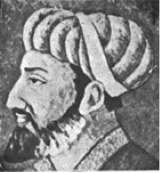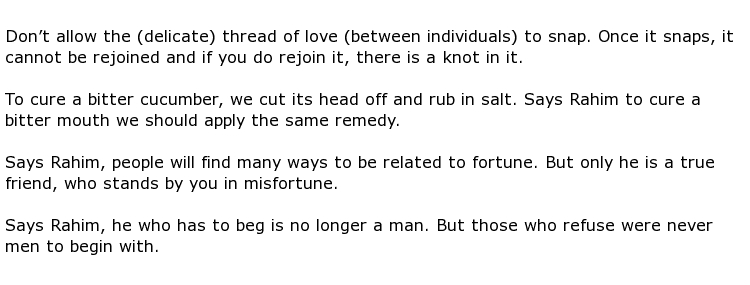 Abdur Rahim Khankhana, who is also called Rahim by many, was an Indian poet and composer who specialised in Hindi rhyming couplets. He was also responsible translating older works into Persian and for a number of books on astrology. He lived during the reign of Akbar, the Mughal emperor and was appointed as one of the principal group of nine ministers at the royal court. There is a small village in the north west of India called Khankhana that has been named after Rahim, lying in the state of Punjab’s Nawanshahr district.
Abdur Rahim Khankhana, who is also called Rahim by many, was an Indian poet and composer who specialised in Hindi rhyming couplets. He was also responsible translating older works into Persian and for a number of books on astrology. He lived during the reign of Akbar, the Mughal emperor and was appointed as one of the principal group of nine ministers at the royal court. There is a small village in the north west of India called Khankhana that has been named after Rahim, lying in the state of Punjab’s Nawanshahr district.
He was born on the 17th December 1556. His father, Bairam Khan, was a trusted member of the emperor’s staff, serving as mentor and guardian to Akbar himself. He was of Turkic origin. The connection with the emperor continued when, following the murder of Rahim’s father in Gujarat, his mother became Akbar’s second wife, thus making Rahim the stepson of the emperor. This may have been one of the main reasons why Rahim was able to secured a ministerial appointment, although this cannot be confirmed either way.
Much of Rahim’s poetry was devoted to the Lord Krishna despite the fact that he was born into the Muslim faith. His faith was very strong and this was demonstrated in the way that he gave alms to the poor. It was done with such humility that he never looked at the person receiving the gift, always keeping his eyes averted, looking downwards. The poet Tulsidas noted this strange behaviour and wrote the following couplet to Rahim:

Rahim responded in kind, taking the opportunity to present a couplet of his own:

This form of poetic expression is common when studying Rahim’s work. The short, two-line statement is often as powerful as it is wise. Here are a few examples:

Rahim, as well as being a deeply spiritual man, was also well educated and was a master of other languages including Sanskrit. For example, he translated a set of memoirs by Babar, the first Mughal emperor, from the Chagatai language into Persian. The great bulk of his work is, of course, the countless dohas that he wrote (the couplets). He also had two books on Astrology published, their titles being Kheta Kautukama and Dwawishd Yogavali.
When Rahim died some time in 1626, at the age of 72, his body was placed in an impressively constructed tomb which still sits today on the Mathura Road in New Delhi. The building of this tomb had been commissioned by his wife in 1598. It is perhaps a morbid thing to do but she was obviously anticipating his death in the future. Some of the marble and sandstone used in its construction was taken in 1754 and used for another tomb, this time for the statesman known as Safdarjung.

